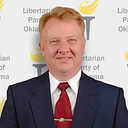What I want from the next Libertarian presidential candidate
Regardless of the results on Nov. 8th, the Johnson/Weld campaign has received unprecedented media attention and will almost certainly leave the Libertarian Party with ballot access in more states for 2018 than any previous ticket has produced for mid-term elections. However, those who believe that Gary Johnson has squandered the opportunity presented by the nomination of the two most disliked establishment party candidates in history have some justification for that opinion. Many criticisms of the LP nominee will be based on style, such as his propensity for gaffes and his occasional failure to adhere to libertarian orthodoxy. These concerns have some validity, but appear to me to be symptoms rather than causes. The underlying problem is one that afflicts many Libertarian campaigns, in that the hard work of retail politics is not prioritized.
Seeking an entrance into debates and forums is certainly valid. It is valuable to any candidate to gain press coverage. But the assumption that these will drive genuine grassroots support is exactly backwards. Personal connections with voters will create a sustained market demand for the candidate to be included in a way that nothing else will. Obviously, a presidential candidate can’t knock on every door. But many state legislative candidates and those seeking municipal or county level offices can. And networks of volunteers can be created in order to knock doors for those campaigns for federal office. The presidential ticket has had a program for these volunteers, but if Gary Johnson or Bill Weld ever said anything about those ground-pounders using the app I never heard it.
Having a solid philosophical understanding of libertarianism is obviously useful for anyone representing the party built around this ideological viewpoint. Those who think that Johnson and especially Bill Weld were not sufficiently libertarian have a point, although the Governors are both preferable to the preceding nominee, Bob Barr. But the notion that being sufficiently libertarian is a cure-all is fanciful delusion. Gary did not get more votes than any previous LP presidential candidate in 2012 because he was a better libertarian, it was because he is a better politician, much the same reason that the 2016 campaign has had the success we’ve seen. They didn’t try to build the kind of ground up organization that is really needed, but Gary Johnson knows how to listen in a way that doctrinaire didacts simply do not. Listening and tailoring the message to the voters is key if the Libertarian Party is to build upon the gains made in 2016.
We cannot count on 2020 being a repeat of this year. It is not only the case that the establishment party that is out of power will have difficulty choosing a standard bearer that is as widely reviled as their choice for this election cycle, but it is also true that not being hated by a majority of the electorate is an insufficient base upon which to build a party that can compete in the political marketplace. Our ideal candidate will be focused on party-building. Teaching libertarian activists and candidates to first find and then persuade voters ought be the highest priority. Getting media coverage is essential, and getting in the debates is an important goal, but these objectives need to be made to serve to increase the viability of the party going forward, not merely to make shallow attempts to increase the result on election day. A vote percentage of 5% for the presidential ticket is something to be proud of, but an average of 10% for Congressional candidates in three-person races is more meaningful, and electing a county commissioner or state representative will be more helpful to the party in the long run.
Our next presidential candidate needs to know that the battle is won on the doorstep.

